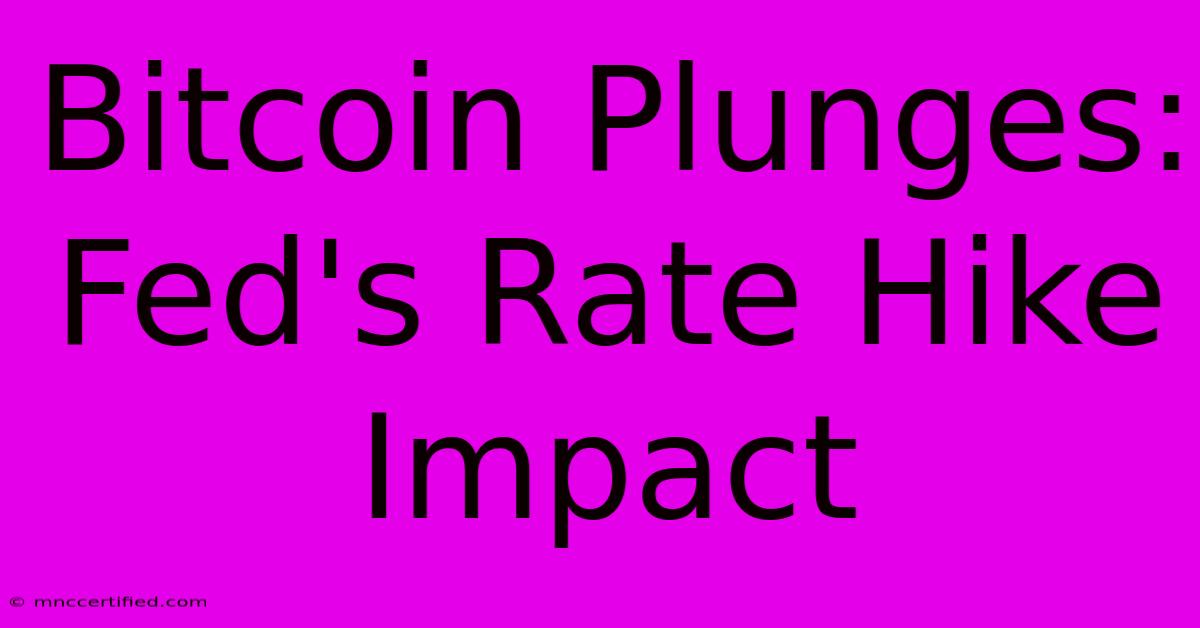Bitcoin Plunges: Fed's Rate Hike Impact

Table of Contents
Bitcoin Plunges: Fed's Rate Hike Impact
The cryptocurrency market, particularly Bitcoin, experienced a significant downturn following the Federal Reserve's recent interest rate hike. This article delves into the reasons behind this plunge, exploring the intricate relationship between monetary policy and digital assets. We'll examine the market's reaction, potential future implications, and offer insights for navigating this volatile landscape.
Understanding the Fed's Rate Hike
The Federal Reserve's decision to raise interest rates aims to combat inflation by making borrowing more expensive. This, in theory, slows down economic growth and reduces demand, ultimately curbing rising prices. However, this monetary tightening has significant ripple effects across global financial markets, including the cryptocurrency space.
How Rate Hikes Affect Bitcoin
The connection between interest rate hikes and Bitcoin's price isn't always direct, but several factors contribute to the observed correlation:
-
Increased Dollar Strength: Higher interest rates often attract foreign investment into US dollar-denominated assets, strengthening the dollar. Since Bitcoin is priced in dollars, a stronger dollar can lead to a decrease in Bitcoin's price as it becomes more expensive for holders of other currencies.
-
Risk-Off Sentiment: Investors often view Bitcoin as a riskier asset compared to traditional investments like bonds or government securities. During periods of economic uncertainty or tightening monetary policy, investors tend to shift towards safer, less volatile options, leading to a "risk-off" sentiment and a sell-off in riskier assets like Bitcoin.
-
Reduced Liquidity: Higher interest rates can impact liquidity in the cryptocurrency market. Investors may withdraw funds from crypto exchanges to take advantage of higher returns offered by traditional financial instruments, reducing trading volume and potentially increasing price volatility.
-
Inflation Hedge Narrative Challenged: Bitcoin was often touted as an inflation hedge. However, the recent correlation between rate hikes designed to combat inflation and Bitcoin's price decline challenges this narrative, at least in the short term. The effectiveness of Bitcoin as an inflation hedge remains a subject of ongoing debate among experts.
Market Reaction and Analysis
The immediate market reaction to the Fed's rate hike was a sharp drop in Bitcoin's price, along with a broader sell-off across the cryptocurrency market. This highlights the market's sensitivity to macroeconomic factors and the interconnectedness of traditional and digital finance. Technical analysis, examining chart patterns and trading volume, can further illuminate the extent and nature of this price movement. However, it is crucial to remember that past performance is not indicative of future results.
Potential Future Implications
The long-term impact of the Fed's actions on Bitcoin remains uncertain. Several scenarios are possible:
-
Continued Decline: If the Fed continues its aggressive interest rate hikes, Bitcoin could experience further price drops as risk aversion persists.
-
Stabilization and Recovery: Once the Fed's tightening cycle concludes, and economic conditions stabilize, investor confidence might return, potentially leading to a recovery in Bitcoin's price.
-
Decoupling: It's possible that over time, Bitcoin will become less correlated with traditional markets, establishing its own independent price trajectory. This however, is dependent on factors like wider adoption and regulatory clarity.
Navigating the Volatility
For investors navigating this turbulent period, a cautious approach is recommended. Thorough research, diversification, and risk management are crucial. Consider the following:
-
Diversify your portfolio: Don't put all your eggs in one basket. Spread your investments across different asset classes to mitigate risk.
-
Dollar-Cost Averaging (DCA): This strategy involves investing a fixed amount of money at regular intervals, regardless of price fluctuations, helping to reduce the impact of market volatility.
-
Stay informed: Keep up-to-date with macroeconomic news and developments in the cryptocurrency market.
Conclusion: Bitcoin's Future in a Rising Rate Environment
The recent Bitcoin plunge following the Fed's rate hike underscores the complex relationship between monetary policy and the cryptocurrency market. While the immediate future remains uncertain, understanding the underlying factors driving this volatility is critical for investors. A well-informed strategy that incorporates risk management and diversification is essential for navigating this dynamic landscape. The long-term prospects for Bitcoin are still subject to debate and depend on a multitude of factors, including technological advancements, regulatory developments, and broader economic trends. Only time will tell how Bitcoin will ultimately fare in a higher interest rate environment.

Thank you for visiting our website wich cover about Bitcoin Plunges: Fed's Rate Hike Impact. We hope the information provided has been useful to you. Feel free to contact us if you have any questions or need further assistance. See you next time and dont miss to bookmark.
Featured Posts
-
Crypto Market Dips Feds Influence
Dec 21, 2024
-
Shortest Day Winter Solstice Saturday Ideas
Dec 21, 2024
-
College Football Indianas 2024 Cfp Odds
Dec 21, 2024
-
Christian Walker Signs Three Year Astros Contract
Dec 21, 2024
-
Confirmed Lineups Bayern Vs Rb Leipzig Match
Dec 21, 2024